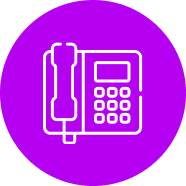You’re a small business in need of upgrading or purchasing a new telephone system but you have no idea where to start or what to even look at. So lets take a look at the two options a small business typically considers and the key points to each solution.
- Traditional PBX System
- VoIP System
Let’s talk about deployment. Depending on the time frame that you require a system, the features you need in the system and plug ins you might need, a traditional PBX system typically requires a lead time which can take a few weeks. A hosted VoIP system is much quicker as you don’t require a physical onsite system besides the handsets.
Features: depending on your business needs, the traditional PBX systems have a lot more simple features vs the more advanced features a hosted VoIP system provides.
Cost: When it comes to cost, the physical PBX setup is more expensive, however, new PBX systems are now typically VoIP compatible which means you can take advantage of the cheaper calls using your data connection. As a hosted solution means the hardware is managed in the cloud, the start up fees are minimal and again, calls are up to 3 times less than a traditional PSTN or ISDN line call.
Future Growth: With the internet, businesses have the ability to scale at a much quicker rate, this means you might need a system that offers you the ability to maintain costs now and scale in the future when needed. A PBX system needs careful planning to be able to scale, a hosted VoIP system is easily scalable as you only require handsets and all features in the cloud can be simply added or removed very easily.
Relocation: Part of the growth discussion with regards to the ease of scalability of the hosted system, VoIP systems are simple and easy as a plug in and play, a traditional PBX not so easy. Although the traditional system offers great security, the upkeep and cost to relocate the physical hardware needs careful planning and organisation.
Recent News
Multifunction Printer Financing Considerations
When the time comes to purchase a [...]
Business NBN Vs Business Fibre Internet
Today, the world has turned into a global [...]
11 Reasons To Automate Accounts Payable
Well proven process automation has been available for [...]
What Is Document Management Software?
A document management system is one that is [...]
5 Reasons To Invest In A Cyber Security Plan
Today computers and the Internet aren’t just used [...]











